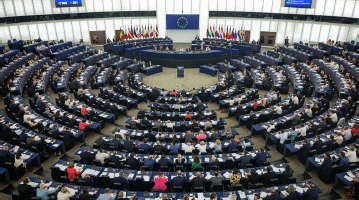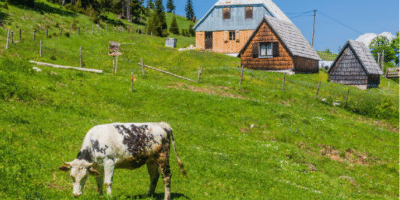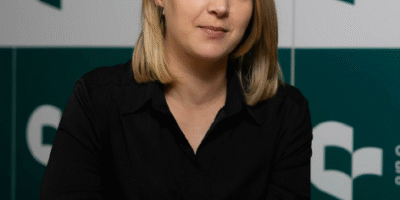Strengthening the judiciary and ensuring the rule of law requires time and perseverance, but these efforts are essential for a strong democracy and Montenegro’s future membership in the European Union (EU), said Estonian President Alar Karis.
Last week, at the invitation of Montenegrin President Jakov Milatović, Karis visited Montenegro and met with top state officials.
In an interview with the MINA news agency, Karis said there are many positive steps evident in Montenegro’s progress toward EU integration.
“We know how difficult parts of the process can be, especially when it comes to strengthening the judiciary and ensuring respect for the rule of law. These require time and persistence, but they are indispensable for a strong democracy and EU membership,” Karis said.
He emphasized Estonia’s understanding of these challenges and expressed readiness to share experiences and provide assistance.
“The most important thing is to stay focused and keep moving forward, even when progress seems slow. In the end, it pays off for the country and its people,” he said.
Karis highlighted that public support plays a vital role in the accession process. “In Estonia, support for EU membership remains high. According to the latest surveys, 84 percent of Estonians support the country’s EU membership,” he noted.
Karis believes EU enlargement is one of the Union’s most powerful tools for promoting stability, democracy, and prosperity in Europe.
For Estonia, one of the greatest challenges during its EU accession was ensuring promised reforms were not just written into law, but implemented in practice.
“It took a great deal of effort to build institutions people could trust and to ensure public services were transparent and efficient. Equally important was maintaining motivation and public support throughout the process,” he said.
Karis noted renewed attention in recent years to EU enlargement, including for the Western Balkans, but stressed that stronger political will and strategic commitment are needed to accelerate the process and make enlargement a tangible priority on the EU agenda.
He recognized Montenegro as a frontrunner among Western Balkan candidates. “You have made steady progress and shown a clear commitment to EU integration. The reforms you’ve launched, especially in rule of law and public administration, are vital. We encourage you to continue decisively on this path,” said Karis.
Estonia, he said, strongly supports Montenegro’s goal of completing accession negotiations by the end of next year.
“We’re ready to help with knowledge-sharing and technical support. The credibility of the enlargement process depends not only on the candidates’ efforts but also on the EU keeping its promises not just to the Western Balkans, but also to Ukraine and Moldova,” he added.
Estonia’s own successful integration into the EU, Karis said, was built on political consensus, consistent reforms, and strong commitment to European values.
“Our key advice to Montenegro would be: stay focused, maintain reform momentum, work together with unity, and ensure that change is more than words that it’s implemented and felt by citizens,” he stressed.
Transparency, rule of law, and strong institutions, he said, are essential. He also emphasized the importance of involving the wider public so that EU membership becomes a national aspiration, not just a political goal.
“Don’t hesitate to learn from others and build partnerships. Estonia is ready to share its experience and support Montenegro we firmly believe your place is in the EU,” said Karis.
He also addressed security, noting that Russia’s full-scale aggression against Ukraine has dramatically changed Europe’s security environment.
“It reminded us all that peace and freedom cannot be taken for granted. In response, NATO and EU countries have united to strengthen defense, deepen cooperation, and support Ukraine in its fight for freedom, independence, and sovereignty,” Karis said.
Estonia, he added, takes its security very seriously, spending over five percent of its GDP on defense this year among the highest levels in NATO.
He emphasized that every country must contribute to making Europe safe and ready to face today’s threats.
Ahead of the upcoming NATO summit in The Hague, Karis said Estonia has three clear priorities: significantly increasing defense spending across the Alliance, sending a strong and unified message about the ongoing threat from Russia, and boosting long-term support for Ukraine.
He acknowledged that the Western Balkans also faces challenges, from political instability to foreign influence, but has shown a strong desire to move closer to the EU.
“Countries like Montenegro have taken concrete steps to align with EU policies something crucial for lasting peace and stability,” Karis said.
“Even in difficult times, unity matters. The more we work together, both in Europe and the Western Balkans, the stronger and safer we become. Estonia fully supports regional cooperation and the Western Balkans’ path toward a secure, democratic EU future,” he added.
Karis also sees strong potential for deeper Estonia–Montenegro cooperation, particularly in digital governance and public administration reform.
“Much of Estonia’s success as a modern nation is built on smart digital solutions, and we’re always happy to share what we’ve learned,” he said.
Digital tools, he noted, can make governments more transparent, efficient, and accessible. “In Estonia, most services from voting to signing contracts can be done online. This has cut bureaucracy, saved money, and built trust between citizens and the state,” Karis explained.
He expressed belief that Estonia and Montenegro can collaborate to improve public services and advance EU integration through shared innovation.
“This is a great way to move forward, especially since digitalization and good governance are key EU priorities,” he said.
Karis concluded by stressing that small European nations have a meaningful role in shaping the EU’s future.
“The EU, though made up of nations of various sizes and backgrounds, operates as one. Decisions are made by consensus, meaning every country large or small has a voice at the table.”
“What matters most is not size, but wisdom, knowledge, and the ability to persuade,” Karis said.
Small countries like Estonia, he noted, have shown that with smart ideas, strong values, and cooperation, they can make a real impact whether in digital innovation, supporting Ukraine, or strengthening European security.
“In today’s complex world, all voices need to be heard. Small states bring unique experiences, creative solutions, and a strong sense of responsibility. By working together, listening, and uniting, we can help build a stronger, safer, and more resilient EU,” Karis concluded.
Written by our correspondent A.A.



